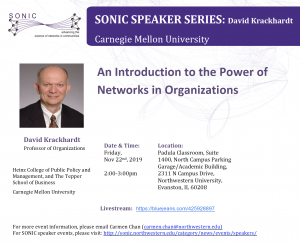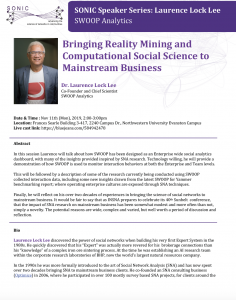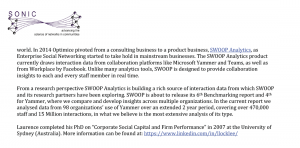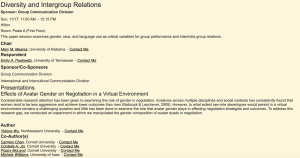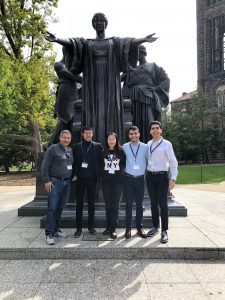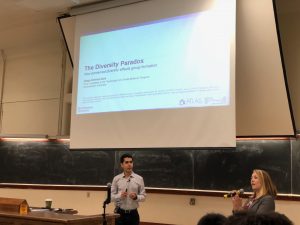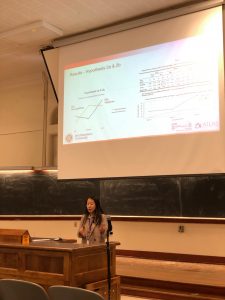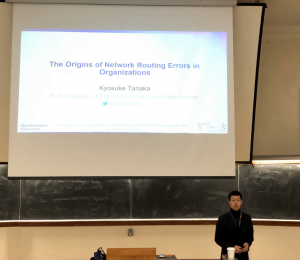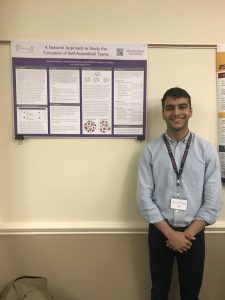Video now availabe on Youtube: https://youtu.be/I9XBbr2ctpM
SONIC is proud to welcome Dr. Hank Green of Indiana University. He will speak on Wednesday, Nov 6th at 10:30 am in Frances Searle Building, Room 3-417. Please contact Carmen Chan with any questions.
 Hank Green
Hank Green
Associate Professor
Department of Applied Health Science, Indiana University School of Public Health
Indiana University Network Science Institute
Network-based Strategies for Improving PrEP Availability Among those at High Risk forHIV
Pharmaceutical Pre-Exposure Prophylaxis (PrEP) has been proven effective against HIV infection, but it is underutilized as an HIV prevention strategy in part due to a lack of familiarity with PrEP treatment regimes among healthcare providers that serve the most at risk communities. Lack of healthcare provider knowledge has been identified as a substantial contributor to the continuing increase of HIV infections among sexual and gender minority patients. An Institute of Medicine report states, “few physicians are knowledgeable about or sensitive to lesbian, gay, bisexual, and transgender (LGBT) health risks or needs.” Nevertheless, physicians often serve as key points of access for this preventive treatment among minority patients who may not know the full range of prevention options. Thus, physicians’ lack of knowledge is likely to limit the highest risk patients’ awareness of, screening for, and access to PrEP. In this study, we propose to develop network-based strategies that help identify physicians who serve populations at high risk for HIV but who prescribe PrEP infrequently and those physicians likely to influence the prescribing behavior of their peers, facilitating the dissemination of information about PrEP via strategically targeted information campaigns.
Physician networks inferred from medical claims data protect patient identities but enable insights into the numbers and kinds of patients shared by physicians across the country and approximate the structure of physicians’ professional communication networks. Prior research has shown that physician networks inferred from shared patients are strongly predictive of the diffusion of shared medical practices. Medical knowledge is exchanged among physicians who share patients with one another because they often go to each other for advice about new treatments, difficult cases, etc. Medical claims data can provide more reliable information than data provided by physician surveys because the latter typically exhibit low response rates and a high likelihood of nonresponse bias. Additionally, acquiring a complete national set of medical claims is affordable whereas acquiring a set of complete national physician surveys would be prohibitively expensive.
Using national-scale claims data and the network generated from them, we tested hypotheses that ask whether PrEP prescribing behavior in physician sub-communities varies based on the whether a physician 1) is or has close ties to an infectious disease specialist, 2) shares patients with PrEP prescribing physicians, 3) shares patients with a doctor that treats a high proportion of HIV patients, 4) treats patients covered by specific insurance providers. While testing these and other hypotheses, we will account for contextual and geographic factors including location of providers in states with high incidence of HIV or in regions with high stigma against MSM. Understanding which of these network features may be associated with knowledge of and prescription of PreP will lead to new strategies that identify doctors who may be most influenced to begin or increase their recommendation of PrEP or who are positioned to shape the PrEP prescribing behavior of their peers, ultimately increasing its utilization among those at risk for HIV. The strategy, while focused here on PrEP, is broadly generalizable for any innovation in medical care that would benefit from a more targeted approach. This study has 3 aims:
Aim 1. Construct a physician-to-physician network relevant to the population indicated for PrEP. We used aggregated medical claims from both private and public payers to create a physician-to-physician network using standard network approaches. The data included all claims for patients being treated with drugs uniquely prescribed for STIs such as HIV and genital herpes, establishing a baseline of shared patients representative of the population indicated for PrEP.
Aim 2. Test alternative hypotheses for processes that may drive PrEP prescription rates. We used information about the distribution of PrEP prescribing in this network to assess the relative contribution of 1) social influence 2) differential awareness of PrEP, 3) geographic variation related to features of the HIV epidemic (such as stigma), and 4) other network based features such as clustering to prescription rates while controlling for factors such as the rural or urban location of a doctor.
Aim 3. We will use the structure of the physician network developed in Aim 1 and the results of our analyses in Aim 2 to identify targets for a strategic information campaign. We will generate a series of rules that identify physician characteristics associated with being an appropriate target and an appropriate peer change agent. Then, based on those rules we will simulate the diffusion of PrEP information and PrEP prescribing behavior in the network we generated in Aim 1. We will also contact a small set of targets and change agents to assess the accuracy of our rules and determine the opinions of these physicans regarding the broader utility of such targeted campaigns for increasing PrEP prescribing, fundamentally affecting the PrEP care cascade.
To learn more about the speaker, please visit: https://publichealth.indiana.edu/research/faculty-directory/profile.html?user=hdgreen
